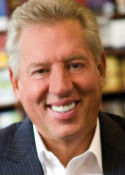Some time ago, I was privileged to be in Mobile, Alabama at the Senior Bowl, where all the great college football players who are graduating seniors come together for their last big game.
I was asked to come down to conduct leadership training to 900 NFL coaches and scouts. The NFL coaches were there, as they always are, looking at the guys who were finishing college to find out who had the potential to be pro football players.
While I was there speaking to the coaches, Dom Capers came up to me. For those of you who don’t know, Dom coaches the new Houston franchise, and was the coach of the Carolina Panthers for several years. He said, “John, let’s do lunch, I want to talk to you about leadership.”
He had an agenda—he wanted to ask me some questions on leadership; but I also had an agenda—I wanted to ask him what it was like to start an expansion team. As the head coach of the expansion Carolina Panthers, he had been so successful that when Houston started their franchise, they said, “We want Dom Capers here.”
I sat down with him and said, “Okay, talk to me about Carolina, first of all.” I’ll never forget. He said, “John, there were some amazing lessons I learned. The good news is, we immediately started winning, but the bad news is, we couldn’t sustain that winning.”
I knew that he was getting ready to tell me something that was pure gold, and I looked at Dom and said, “Okay, talk to me about this. Why could you not sustain the winning?” He looked at me and said, “John, we took shortcuts. I went after players who could give me instant success.”
I think that Carolina went 9 and 7 the first year—they had a winning record. He said, “I went after players who could help me win today, but I didn’t develop and I didn’t build the team for the long haul.”
“In fact,” he said, “I had NFL coaches come to me and say, ‘Dom, don’t do that. You’re winning too fast. You’re going to spoil the people in Carolina; they’re going to think that this is easier than it really is.'” Then he said, “Here’s the blueprint for an expansion team to become a champion: don’t go for the quick fix. Build slowly and solidly.
“In the expansion draft, there are so many good players and so many veteran players. If I were to pick the best players off of these other teams, I believe I could have a winning record my first year in Houston; but my goal is not to have a winning record the first year. In fact, we’ve already determined that we’ll take no one over the age of 30 in the expansion draft. We’re going to go after young players, we’re going to draft well, we’re going to spend our time developing our players, and we’re going to build slowly for the long haul.”
Dr. John C. Maxwell’s free monthly e-newsletter
Leadership Wired available at www.injoy.com.
John Maxwell grew up in the 1950s in the small Midwestern city of Circleville, Ohio. John's earliest childhood memory is of knowing that he would someday be a pastor. He professed faith in Christ at the age of three, and reaffirmed that commitment when he was 13. At age 17, John began preparing for the ministry. He attended Circleville Bible College, earning his bachelor's degree in 1969. In June of that same year, he married his sweetheart, Margaret, and moved to tiny Hillham, Indiana, where he began his first pastorate.
While serving in his second church, Maxwell began to study the correlation between leadership effectiveness and ministry effectiveness. On July 4, 1976, while preaching at a service commemorating America's bicentennial, John sensed that God was calling him into a ministry to pastors. Within days after that event, pastors began to contact him, asking for his assistance in nurturing their churches. Over the next four years, on an informal basis, John helped scores of fellow pastors. Then, in 1980, he was asked to become Executive Director of Evangelism for the Wesleyan denomination.
Though his time at Wesleyan headquarters was productive, John soon realized that his deeper desire was to help pastors from numerous denominations. He knew that desire would be unfulfilled if he were to stay at denominational headquarters. As a result, in 1981 John accepted the call to return to the pastorate, this time at Skyline Wesleyan Church in the San Diego, California area. But he did so with the church's blessing to pursue his vision. The Skyline congregation allowed him to continue mentoring and assisting pastors even as he led them to new levels.
In 1985, as he continued to equip and encourage other pastors, John took the next crucial step in leadership development. He founded a new company called INJOY and created the INJOY Life Club, featuring a monthly tape for leaders. The fledging operation, established in the corner of a garage, was soon bursting at the seams. The INJOY Life Club tapes were received with great enthusiasm, and the number of subscriptions quickly increased from hundreds to thousands. Simultaneously, the demand for other resources and seminars exploded. Pastors from coast to coast were responding, and their desire for help was even greater than John had anticipated.
As the years passed, INJOY began demanding more and more of John's time. In 1995, he resigned from his position as senior pastor at Skyline following a very fruitful 14-year tenure. The church had tripled in size and its lay ministry involvement had increased ten-fold. Dr. Maxwell is in great demand today as a speaker. Through his bestselling books, audio and video resources, and major conferences, he communicates directly with more than one million people every year. He is frequently asked to speak for organizations such as Promise Keepers and Focus on the Family, but his greatest joy and desire is to help pastors become better leaders.
Because the need for leadership development knows no borders, John established EQUIP, a non-profit organization which trains leaders in urban communities, academic institutions, and within international organizations. EQUIP is also spearheading a movement which has enlisted more than one million pastoral prayer partners who covenant to pray specifically for those who shepherd God's flock.
John continues to seek new opportunities to help churches and church leaders. He knows that one thing is constant: the only hope for the world is salvation through the Lord Jesus Christ, who gives life abundantly.






